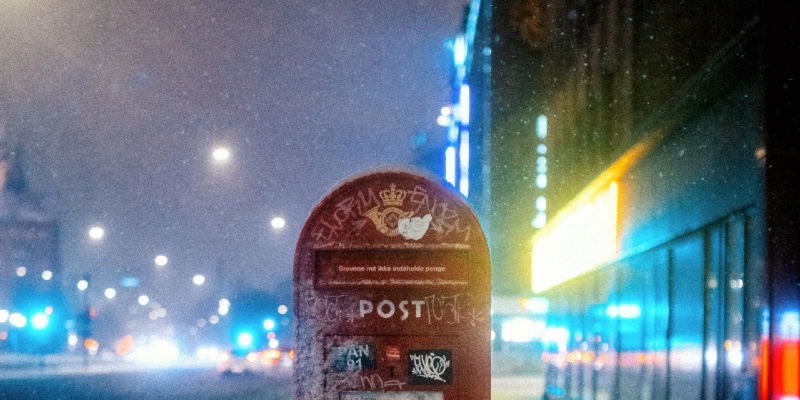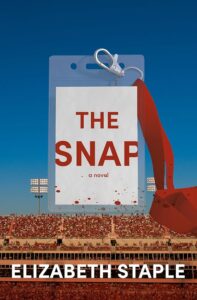Last November, a family friend I’ll call Paul received an envelope in the mail. Inside was a notecard that said, “Hi” in cutout letters. There was no signature, no return address. Just ‘Hi” and four seemingly random stickers: the MTV logo, a cassette, a bird, and an animal.
More anonymous mail followed. Paul got a potato from Texas. A postcard from Indiana that said, “Howdy, those tacos were amazing, right??” A card with doll eyes glued inside. A figurine, along with another cut-letter note reading, “Say hello to my little friend. I call him Paul.” The allusion to the famous line from Scarface was especially discomforting, as in the movie it comes just before a barrage of gunfire. There were objects with Paul’s face pasted or printed on them, and envelopes full of oddly folded bits of paper. They came from different states and in different forms. The handwriting varied. One note arrived while Paul and his wife were out of town: “I miss you! When are you coming home?” Those same words would be warmly welcomed from a friend, but unsigned they were stretched and mocking, shot through with an electric charge. Someone is watching. They know the house is empty. Will it still be empty when we step inside the door?
After five months and more than thirty pieces of mail, Paul filed a complaint with the Postal Service. Next, a discovery by its internal inspector sent him to the police.
What is it about an anonymous note that brings such a cryptic thrill? There are deeply rooted, evolutionary reasons why that missing signature lifts the hairs at the back of our necks. The brain initiates a stress response—commonly referred to as fight-or-flight—as soon as it perceives danger. The amygdala’s emotional processing center signals the hypothalamus, which in turn directs physical reactions throughout the body. Breathing, blood pressure, and heart rate increase, flooding the muscles with extra oxygen. The pupils dilate, broadening the range of peripheral vision, and blood literally thickens to help guard the body against injury. We are built to survive threats. But that survival is predicated on the interpretation of clues, and in their absence the stress response kicks into overdrive.
Consider the following scenarios:
- You find an unsigned note in your locker indicating that you have a secret admirer OR you find a note in your locker from Steve, your lab partner, revealing that he has a crush on you.
- You ride a rollercoaster for the first time, experiencing its twists and drops at random OR you ride a rollercoaster for the tenth time and are familiar with its topography.
- You return home to find your former roommate has let himself in with his old key and is now asleep on the couch OR you know your former roommate has a key and could enter at any time and go anywhere in the apartment, but he leaves no trace and you never know where he went or indeed if he had been there at all.
Researchers have found that unpredictability significantly increases a person’s stress reaction. In one study, participants were subjected to a series of harmless but painful electric shocks. In instances where there was just a 50 percent change of receiving the shock, participants sweated more and showed increased pupil dilation compared to situations where participants knew with 100 percent certainty that they would receive a shock. Uncertainty about the timing and intensity of the shocks also increased the response, and extended periods in that state can result in hypervigilance, where almost any stimulus is perceived as a threat. The body can handle a threat. It is less equipped to cycle through all possible future threats.
That fear of the unknown is used to great effect in literature. An unsigned letter sends Sherlock Holmes off on one of his greatest adventures in The Hound of the Baskervilles, and that story depends on the knowledge and anticipation of the way humans react to uncertainty. Horror royalty Lois Duncan and Christopher Pike use anonymous notes to bring groups of teenagers to account for past misdeeds in I Know What You Did Last Summer and The Chain Letter, respectively.
My novel, The Snap, opens with the death of NFL coach Red Guillory. Poppy Benjamin, the team’s Media Relations Director, returns from the press conference announcing Red’s death to find an unsigned note on her desk. I know what you did. Tell the truth or pay the price. You have five days. Poppy’s fight-or-flight instinct kicks in immediately, although as a seasoned PR professional, her brain automatically reaches for a third option: bury. To Poppy, it is less important who sent the note than that no one ever finds out about it. But is the timing of the note incidental to Red’s death, or are the two connected? What level of threat should Poppy be worrying about here?
Back to Paul. The Post Office inspector identified a credit card tied to some of the mailings, which revealed an odd connection: Paul is the Village Treasurer of my hometown, and the owner of the credit card was a Village Trustee. They had been friends for years, with Paul even attending the Trustee’s wedding. In a reversal of The Hound of the Baskervilles, where an apparently earnest warning is misinterpreted as a joke, the trustee claimed she had been sending Paul cards, gifts, and letters as a lighthearted prank. That reasoning was incongruous with the experience, which had left Paul and his family deeply shaken. Based on the evidence, the Trustee and her wife were each charged with one count of fourth-degree stalking and harassment. Paul may have been shocked and angered to learn that his months of anguish had been at the hands of a former friend. But once the sender had been identified, his family could move forward with consequences and closure.
Until a new kind of unsigned note—an herbal mixture later identified as “hot foot powder”—was sprinkled on their front step by yet another anonymous person. And then the mystery, and the body’s struggle to process the unknown, began again.
***
Referenced Sources:
https://www.bbc.com/worklife/article/20211022-why-were-so-terrified-of-the-unknown
https://www.healthline.com/health/mental-health/fight-flight-freeze#in-the-body


















